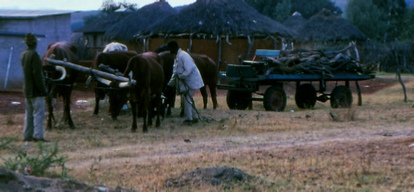© 2018 Dr Margaret Sheppard
Setswana Traditional) Wedding
Early in the morning the men will have slaughtered the wedding feast beast in the kraal in the Kgotla. The horns and cuts of butchered meat are displayed on the fencing. The men cook the meat in the Kgotla.












Relatives brew and bring beer for the feast. The men lead and the women follow in a line with the beer dispensed into white buckets that on arrival they pour into a large clay pot. They might bring one with them (see left hand picture)




Large quantities of wood are required for cooking the wedding feast. This is gathered and brought in from the Lands or Cattle post by the men
A traditional doctor protecting the wedding against sorcery -the gentleman in the dark jacket. Here he is protecting the pots. and the slaughtered beast for the feast One will be called to the bride's home and the groom's family will call their own.
A traditional doctor is always called to doctor both homes to protect against sorcery. According to the individual traditional doctor and also what he "sees" he should do from his bones which he always throws at the commencement of his work, he will probably protect by "washing" the firewood, the entrances to the yard and houses, and also the pots that will be used to cook food for the feasts. The transport to be used, such as cars and ox carts, during the marriage may also be protected so that no "accidents" should befall the bridal couple. The traditional doctor is of course paid for his services; according to how much his bones “tell" him, but usually the fee would be in the region of a goat or in the case of having to avert or overcome any difficult problems he has "seen", it may be a cow.
After the food has been protected in this way it is believed that, if a sorcerer subsequently tries to challenge the marriage, her sorcery will be reflected back to her. One very commonly held belief is that if anyone chokes whilst eating at a marriage it means that that person has tried to bewitch the food with poison.
Women prepare the rest of the feast and serve, wash up etc.















